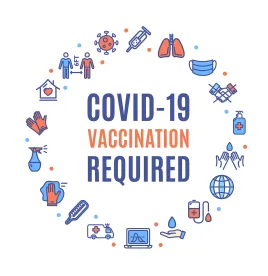On September 9, 2021, US President Joe Biden announced a multipronged plan to increase the number of Americans who are vaccinated for COVID-19. In the plan, titled “Path Out of the Pandemic: President Biden’s COVID-19 Action Plan,” the Biden administration provides for multiple regulatory and executive order-based means to encourage or require vaccination in various workplace settings.
Specifically, some form of vaccine mandate will apply for employers with 100 or more employees; for most Centers for Medicare & Medicaid Services (CMS) regulated workplace settings; and for some federal contractors, as well as all federal executive branch workers.
The plan, and President Biden’s federal employee and contractor executive orders, provide highlights of what is to come, but they leave many questions unanswered. These questions will be addressed in forthcoming emergency rules and standards issued by the US Occupational Safety and Health Administration (OSHA), CMS and Safer Federal Workforce Task Force (the Task Force) guidance.
Here is what we know so far, and what we are waiting to learn:
IN DEPTH
ALL EMPLOYERS WITH 100 OR MORE EMPLOYEES MUST ENSURE VACCINATION OR REGULAR TESTING OF THEIR WORKFORCE.
OSHA will develop a rule (known as an emergency temporary standard, or ETS) that will require all employers with at least 100 employees to ensure that each member of the workforce is either fully vaccinated or, for those who are not fully vaccinated, require such workers to produce a negative COVID-19 test result on at least a weekly basis before coming to work. As announced, it appears that the impending OSHA ETS will permit employers of 100 or more employees to present an option to all workers to either vaccinate or test (workers would be able to select either option).
In addition, the OSHA ETS will require employers with more than 100 employees to provide paid time off for the time it takes for workers to get vaccinated or to recover if they are unwell post-vaccination.
President Biden’s announcement did not address several questions, including: how employers are to count their employees for the 100-employee threshold (e.g., should multiple subsidiaries be aggregated); who pays for the COVID-19 testing (both time spent testing and reimbursement for any expenses); whether there will be reimbursement for the paid time off (similar to the Families First Coronavirus Response Act) or if this will be the employer’s burden to fund; whether there will be any cap to the vaccination-related paid time off; the deadline for compliance with the vaccination or testing requirement; or the anticipated timing for OSHA to release its ETS. The plan does state that the administration will be expanding free COVID-19 testing sites and working to lower the cost of at-home testing kits.
Interestingly, while the plan states that the OSHA ETS will apply to employers with 100 or more “employees,” it also states that such employers must ensure that their “workforce” be vaccinated or tests; it also states that “workers” receive paid time off to get vaccinated. It is not clear whether the OSHA ETS will require employers to implement such vaccination or testing mandates (and such paid time off schemes) for non-employee workers such as independent contractors and volunteers.
Employers should note that in June 2021, OSHA issued a different ETS imposing various COVID-related requirements on solely healthcare industry employers. The anticipated ETS requiring vaccination or testing has not yet been released as of the time of this article. Employers should exercise caution when researching requirements under “the OSHA ETS” to avoid referencing inapplicable regulations.
FOR HEALTHCARE EMPLOYERS, MOST CMS-REGULATED SETTINGS WILL BE REQUIRED TO MANDATE VACCINATION FOR ALL WORKERS.
CMS will issue an Interim Final Rule with Comment Period, to be issued in October, which will require COVID-19 vaccinations for workers in most healthcare facility settings that receive Medicare or Medicaid reimbursement. The Rule will cover—without limitation—hospitals, dialysis facilities, ambulatory surgical settings and home health agencies, in addition to nursing facilities (as was already announced by CMS prior to the administration’s plan).
The CMS vaccination mandate will include nursing home staff as well as staff in hospitals and other CMS-regulated facility settings, and the definition of “worker” covered by the CMS Rule will be broad. As with some other state and local healthcare vaccination mandates, CMS’s rule will cover workers that are employees as well as non-employee workers in CMS-regulated facilities; this will include clinical staff, individuals providing services under arrangements, volunteers, and staff who are not involved in direct patient, resident or client care.
The plan states that it will cover “most” CMS-regulated settings. Other than those specific types of facilities listed above, it is not yet clear how expansive CMS’s Interim Final Rule or the Rule will be.
Recently, several state and local vaccination mandates have been issued with short turnaround times for compliance. Given that many vaccination regimens require two doses spaced apart by several weeks, with “fully vaccinated” status achieved only after 14 days past the final dose, CMS-regulated healthcare employers may choose to implement vaccination mandates ahead and in anticipation of the CMS Rule to avoid gaps in staffing caused by delayed vaccination. Many such organizations have done so.
FEDERAL CONTRACTORS MUST COMPLY WITH THE EVER-EVOLVING SAFER FEDERAL WORKFORCE TASK FORCE GUIDANCE.
President Biden issued two executive orders on September 9, 2021, one which requires executive branch federal employees to be vaccinated for COVID-19, subject to exceptions as required by law; and one which requires federal contractors to comply with all guidance issued by the Safer Federal Workforce Task Force. The Task Force guidance applies to any workplace where an individual works on a federal contract.
As of the publication of this article, the Task Force’s latest guidance—in the form of model safety principles for federal agencies—was published on September 13, 2021. The guidance requires federal employees to be fully vaccinated, except in limited circumstances where an employee is legally entitled to a reasonable accommodation. Additional guidance is expected to be issued in the coming weeks, which will extend this vaccination requirement to workers who work on federal contracts.
Although the executive order for federal contractors was effective “immediately,” it applies to new, extended or renewed contracts entered into, extended or renewed as of October 15, 2021, with some limited exceptions. As of that date, federal contractors subject to the executive order will also be required to include similar requirements in their contracts with subcontractors, requiring those subcontractor workers to be vaccinated absent a legally protected exception.
In sum, contractors (and subcontractors) who are in the middle of a contract term are not required to implement these changes into the applicable contract until the term is extended or renewed, or the parties enter into a new contract, at which time the contract will be amended to require the contractor (or subcontractor) to comply with the Task Force guidance and vaccine mandate.
Notably, the executive order applies only to contracts that fall into certain categories. One exception from the definition of “federal contracts” are federal grants.
Note: On September 24, 2021, the Safer Federal Workforce Task Force published additional guidance for federal contractors. A client alert regarding the guidance is forthcoming.







 />i
/>i

